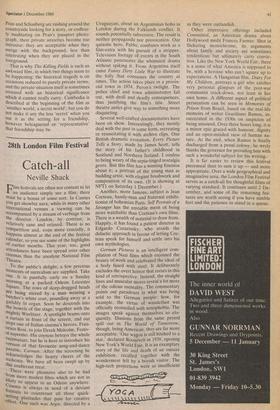28th London Film Festival
Catch-all
Neville Shack
Film festivals are often not content to let an audience simply see a film; there must be a bonus of some sort. In Cannes You get showbiz aura, while in many other international venues a viewing can be accompanied by a stream of verbiage from the director. London, by contrast, is relatively sane and relaxed. There is no competition and, even more crucially, it happens almost at the end of the festival calendar, so you see some of the highlights of earlier months. This year, too, good attendances have been spread over other cinemas than the anodyne National Film Theatre.
To the public's delight, a few precious moments of surrealism are supplied. Take °ne. It is painfully early on a Sunday morning at a packed Odeon Leicester Square. The rows of sleep-drugged heads are being stirred by a man wearing a butcher's white coat, pounding away at a garishly lit organ. Soon he descends into the bowels of the stage, together with the 'nightly Wurlitzer. A spotlight beams onto a curtain in front of the screen, and out steps one of Italian cinema's heroes, Fran- cesco Rosi, to join Derek Malcolm, Festiv- al supremo. His coyness betrays the whole razzmatazz, but he is here to introduce his version of that favourite song-and-dance parable, Carmen. After the screening he acknowledges the hearty cheers of the audience. We have all been swept up by this exuberant treat.
‘. There were pleasures also to be had ,rrom more modest films which are not as Likely to appear in an Odeon anywhere. Cinema is always in need of a deviant formula to counteract all those quick- setting platitudes that pass for creative
• effort. One such was Argie, directed by a
Uruguayan, about an Argentinian hobo in London during the Falklands conflict. It sounds potentially subversive. The result is neither propaganda nor provocation. Our quixotic hero, Pablo, combines work as a film-extra with his pursuit of a stripper.
Television footage of events in the South•Atlantic punctuates the whimsical drama without spiking it. From Argentina itself came Funny Dirty Little War to illustrate the folly that consumes the country at times. The action takes place in a provin- cial town in 1974, Peron's twilight. The police chief and town administrator fall out, with droll and deadly consequences, thus justifying the film's title. Street theatre antics give way to something more disquieting.
Several well-crafted documentaries have been on show. Interestingly, they mostly deal with the past in some form, recreating or resuscitating it with archive clips. One British dramatic evocation, Every Picture Tells a Story, made by James Scott, tells the story of his father's childhood in Scotland and Northern Ireland. I confess to being weary of the sepia-tinged nostalgia genre. But this film has a winning fineness about it; a portrait of the young man as budding artist, with elegant brushwork and composition of its own. (It is showing at NFT1 on Saturday 1 December.) Another, more famous, subject is Jean Cocteau, handy-man and fraternal exhibi- tionist of bohemian Paris. Self Portrait of a Stranger has the enviable merit of being more watchable than Cocteau's own films. There is a wealth of material to draw from. Happily, it has found a patient director in Edgardo Cozarinsky, who avoids the didactic approach in favour of letting Coc- teau speak for himself and settle into his own mythologies.
German Pictures is an intelligent com- pilation of Nazi films which enjoined the beauty of work and celebrated the ideal of a body fused with steel. It deliberately excludes the overt horror that recurs in this kind of retrospective. Instead, the straight lines and muscular mores reveal a lot more of the odious mentality.. The commentary points out paradoxes in what was being sold to the German people: how, for example, the virtue of wanderlust was officially reconciled with xenophobia. The images speak against themselves so elo- quently. Illusions from the same period spill out in The World of Tomorrow, though, being American, they are far more acceptable. 'Our wagon is still hitched to a star,' declared Roosevelt in 1939, opening New York's World Fair. It is an exemplary story of the life and death of an outsize exhibition, recalled together with the wonderment felt by a boyish visitor. The high-tech projections were as insufficient
as they were outlandish.
Other impressive offerings included Committed, an American drama about Hollywood misfit Frances Farmer. Shot in flickering monochrome, its arguments about family and society are sometimes tendentious but ultimately carry convic- tion. Like the New York World Fair, there is a sense of what America is supposed to be, with a heroine who can't square up to expectations. A Hungarian film, Diary For My Children, portrays a girl who catches very personal glimpses of the post-war communist crack-down, not least in her own home. A different aspect of political persecution can be seen in Memories of Prison from Brazil, based on the real-life memoirs of writer Graciliano Ramos, in- carcerated in the 1930s on suspicion of being unsound. Over three hours long, it is a minor epic graced with humour, dignity and an open-minded view of human na- ture. At the end, when Ramos is finally discharged from a penal colony, he wryly thanks the governor for providing him with such a wonderful subject for his writing.
It is far easier to review this festival piecemeal than to sum it up — and more appropriate. Over a wide geographical and imaginative area, the London Film Festival serves as a catch-all for thoughtful films of varying standard. It continues until 2 De- cember, and some of the remaining fea- tures are worth seeing if you have nimble feet and the patience to stand in a queue.






















































 Previous page
Previous page